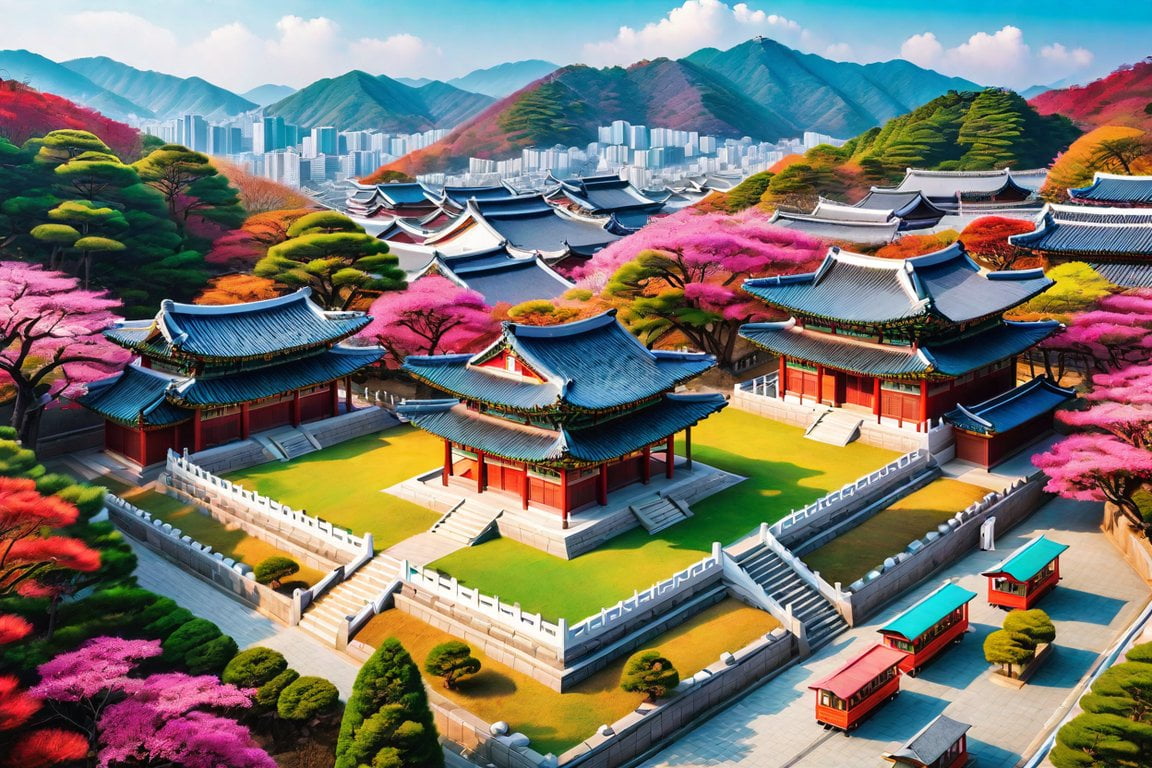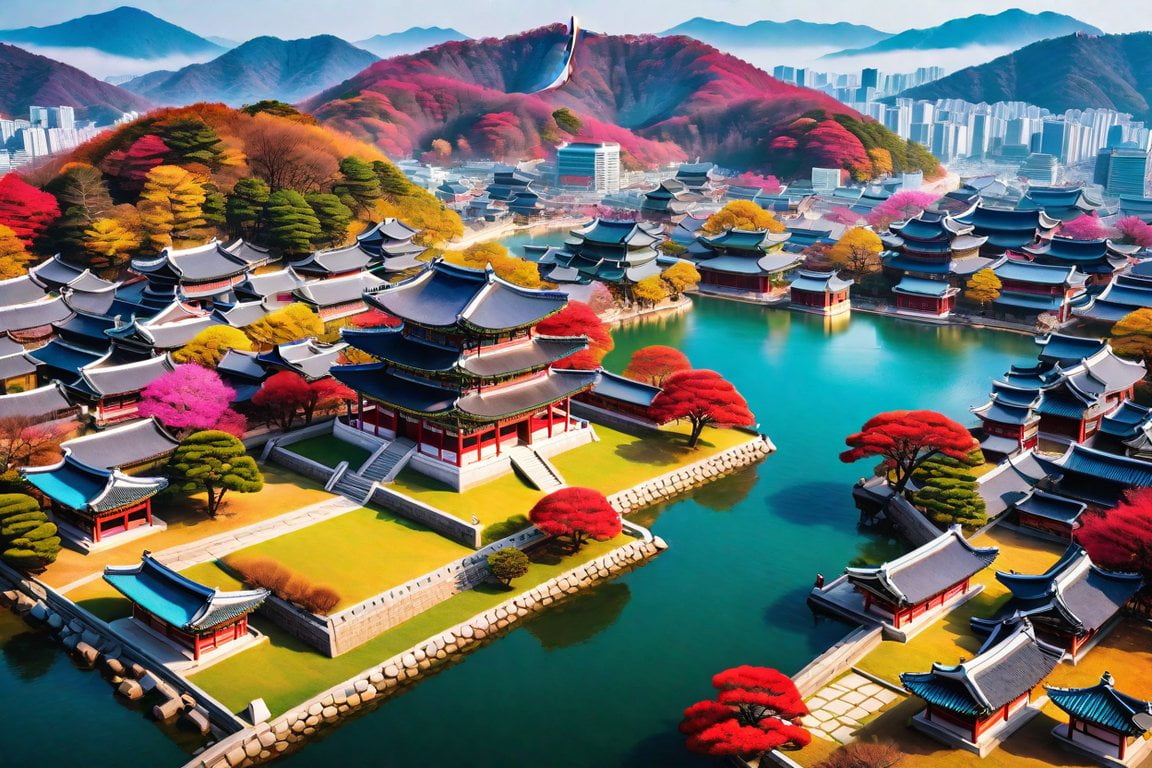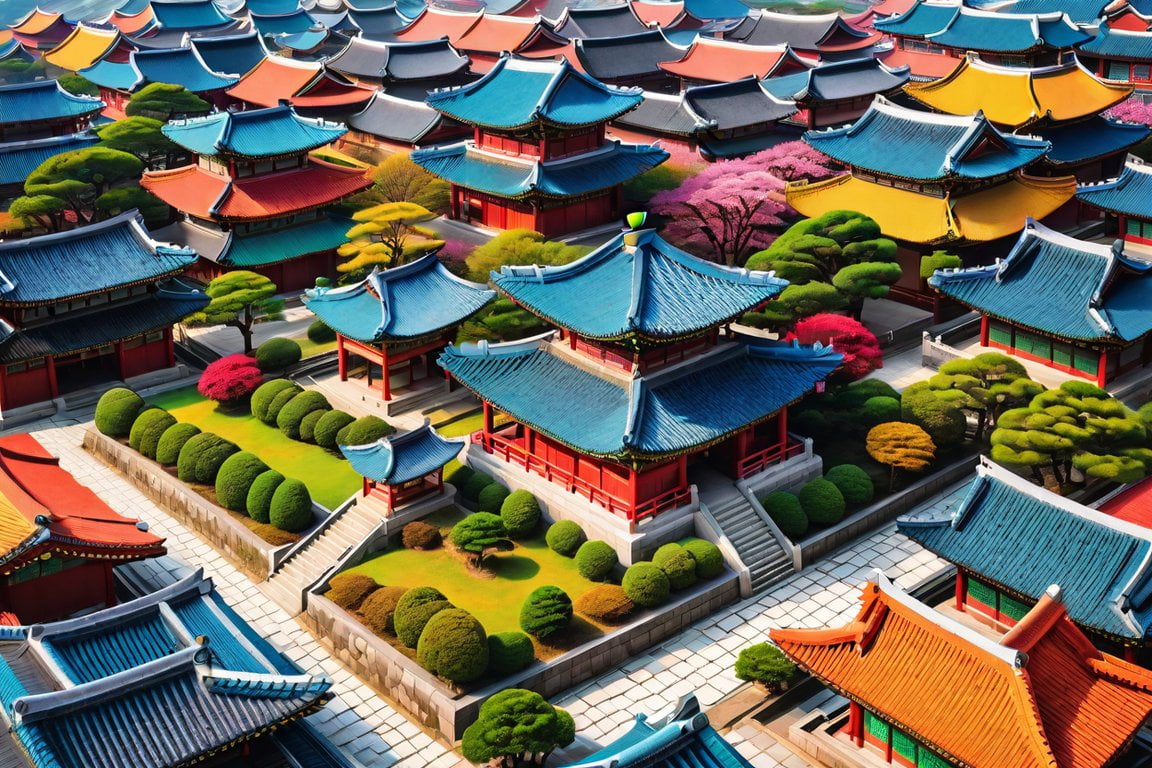Discovering South Korea: 10 Fascinating Facts unveils an intriguing array of insights into the vibrant and captivating country of South Korea. From the prevalence of love motels to the unique tradition of assigning age, these ten facts showcase the intriguing blend of tradition and modernity that defines this East Asian nation. Prepare to be amazed as we delve into the fascinating beliefs surrounding fans in closed rooms and explore the global dominance of a popular soju brand.

Key Takeaways:
- South Korea consists of over 4,000 islands.
- The Demilitarized Zone (DMZ) is a wildlife haven that separates North Korea from South Korea.
- South Korea and North Korea are still technically at war.
- Fan death is a superstition in South Korea.
- Koreans are the largest drinkers in Asia.
- Valentine’s Day is for guys in South Korea.
- Couples celebrate Christmas while families celebrate New Year in South Korea.
- Koreans prefer titles over names.
- Tetraphobia is the fear of the number four in South Korea, considered unlucky.
- South Korea has the fastest internet speed in the world.
- South Korea has the highest rate of plastic surgery per capita globally.
- Kimchi, fermented cabbage, is South Korea’s national dish.
- South Korea has mandatory military service for men.
- South Korea leads in technology, pop culture, and beauty products globally.
- Hangul, a unique alphabet invented in the 15th century by King Sejong, is used in South Korea.
- South Korea has a high suicide rate, especially among the elderly.
10 Facts About South Korea
South Korea is a country filled with wonders and surprises. From its rich cultural heritage to its cutting-edge technology, there are countless fascinating facts that make this country truly unique. In this article, we will delve into 10 intriguing facts about South Korea that are sure to pique your interest and leave you wanting to know more.
1. South Korea consists of over 4,000 islands
Did you know that South Korea is home to a staggering number of islands? With over 4,000 islands dotting its coastline, this captivating country offers a plethora of hidden gems waiting to be discovered. From the picturesque Jeju Island to the serene Ulleungdo Island, each island has its own distinct charm and natural beauty.
2. The Demilitarized Zone (DMZ) separates North Korea from South Korea and is a wildlife haven
The Demilitarized Zone, or DMZ, is a strip of land that acts as a buffer between North Korea and South Korea. While it is heavily guarded, it is also an unexpected wildlife sanctuary. With limited human activity, the DMZ has become a haven for diverse flora and fauna, including endangered species such as red-crowned cranes and Amur leopards.
3. South Korea and North Korea are still at war
Contrary to popular belief, the Korean War never officially ended. The armistice signed in 1953 merely brought about a ceasefire, leaving North Korea and South Korea technically still at war. This ongoing tension between the two countries has shaped South Korea’s military culture and its commitment to national defense.
4. Fan death is a superstition
You may have heard the intriguing myth about fan death in South Korea. According to this superstition, leaving an electric fan running in a closed room overnight can lead to suffocation or even death. However, this belief lacks scientific evidence and is considered nothing more than an urban legend.
5. Koreans are the largest drinkers in Asia
South Koreans love to raise their glasses and enjoy a night out. They are known for their love of alcohol, making them the largest drinkers in Asia. From anju (food paired with alcohol) to the traditional rice wine called makgeolli, the drinking culture in South Korea is an integral part of socializing and building relationships.
6. Valentine’s Day is for guys
In South Korea, Valentine’s Day is a little different. Instead of women receiving gifts from their partners, it is the men who are showered with love and presents. On this day, women express their affection by giving chocolates, gifts, or even handwritten letters to the special men in their lives.
7. Couples celebrate Christmas while families celebrate New Year in South Korea
While Christmas is widely celebrated in South Korea, it is more focused on couples rather than families. Christmas Eve and Christmas Day are seen as romantic occasions, with couples exchanging gifts and enjoying festive activities. On the other hand, the Korean Lunar New Year, known as Seollal, is a time for families to come together, pay respects to ancestors, and share traditional meals.
8. Koreans prefer titles over names
Unlike Western cultures, where using first names is common, Koreans have a strong preference for using official titles or social position when addressing someone. This reflects the emphasis on hierarchy and respect in Korean society. It is considered polite to use these titles, such as “sunbae” (senior) or “hyung” (older brother), to show proper respect and maintain harmonious relationships.
9. Tetraphobia is the fear of the number four, which is considered unlucky in South Korea
In South Korea, the number four is associated with bad luck due to its similarity in pronunciation to the word for “death.” This superstition, known as tetraphobia, has led to the omission of the number four in many buildings, such as hospitals and hotels, as well as the avoidance of giving gifts in sets of four.
10. South Korea has the fastest internet speed in the world
One of the most impressive feats of South Korea is its blazing-fast internet speed. Not only does it have extensive broadband infrastructure, but it also boasts the fastest average internet connection speed in the world. This technological advancement has contributed to South Korea’s leading role in the global technology industry.
South Korea is a country of contrasts, where ancient traditions coexist with modern innovations. These 10 fascinating facts only scratch the surface of what this incredible country has to offer. So, if you’re ready for an adventure filled with rich culture, breathtaking landscapes, and captivating discoveries, South Korea awaits you.
Here are some active internal links with their respective anchor text and URLs:
- Facts about Phi Beta Sigma – Want to discover intriguing facts about Phi Beta Sigma? Click here and learn more about this fascinating fraternity.
- Fun facts about Highland cows – Curious about Highland cows? Explore interesting and entertaining facts about these charming creatures by clicking this link.
There’s a widespread belief that fans in closed rooms might kill you
Electric fans have become an integral part of our daily lives, providing much-needed relief during hot summer days. However, in South Korea, there exists a captivating belief known as “fan death.” Yes, you heard that right – there’s a widespread belief that fans in closed rooms might actually kill you.
This belief, although scientifically unfounded, has persisted in South Korea until the mid-2000s and still resonates to a lesser extent today. You might be wondering how such a belief came to be and why it persists. Well, let’s take a closer look.
The Origins of Fan Death
The belief in fan death provides a simple explanation for mysterious deaths that occur with no apparent cause. When confronted with something unexplainable like sudden death, humans tend to search for rational explanations that bring comfort. In South Korea, the belief in fan death does just that.
The Theories Behind Fan Death
There are three primary theories as to why leaving a fan running in a closed room overnight might kill a person. The first theory suggests that fans create a closed space devoid of oxygen, leading to suffocation. The second theory argues that fans create an airflow that can cause hypothermia, especially when combined with the body’s natural cooling mechanisms during sleep. Finally, the third theory claims that fans circulate harmful particles or carbon dioxide, leading to poisoning.
Cultural Significance and Precautions
The belief in fan death is deeply ingrained in South Korean culture. It is not uncommon to find fans sold in South Korea equipped with timers to prevent people from falling asleep with the fan running all night. This precautionary measure acknowledges the lingering belief while ensuring people have a good night’s sleep without worry.
A Sneak Peek into Other Fascinating Facts about South Korea
While the belief in fan death may seem peculiar, it is just one of the many intriguing aspects of South Korea. Let’s take a quick journey through some more captivating facts:
1. Esports Culture and Technological Advancements
South Korea is known as the mecca of esports. With a thriving gaming industry and a dedicated fanbase, competitive gaming has become a remarkable phenomenon in South Korean society. Not only that, but South Korea also takes pride in its technological advancements, with astonishing innovations that have revolutionized various industries.
2. Ever-Popular Last Names
Almost half of all Koreans have the last names Lee, Park, or Kim. These last names have deep historical and cultural significance, reflecting the influence of traditional familial ties and the hierarchical structure of society.
3. The World of Plastic Surgery
Plastic surgery is quite common in South Korea, with a significant percentage of Koreans having undergone some form of cosmetic enhancement. It showcases the country’s emphasis on beauty standards and the desire to achieve an ideal appearance.
4. From Rags to Riches
South Korea has seen a remarkable economic leap in modern history. From a war-torn nation to a thriving economic powerhouse, the country’s growth story is a testament to the resilience and ingenuity of the Korean people.
5. Kimchi: A Life-Sustaining Food
Kimchi, a spicy fermented cabbage dish, holds a special place in Korean cuisine. It is not only delicious but also considered a life-sustaining food due to its nutritional value and the probiotics it provides.
6. Spreading the Korean Wave
Hallyu, or the Korean wave, has been spreading Korean culture and entertainment worldwide. From K-pop music to Korean dramas, the influence of Hallyu has captivated global audiences, making South Korea a hub for cultural exports.
7. The Pursuit of Education
South Korea places a strong emphasis on education, boasting a highly competitive education system. The pursuit of academic excellence is deeply ingrained in Korean society, with students facing intense pressure to succeed.
8. Soju: A Global Favorite
Soju, a Korean alcoholic beverage, holds the crown as the most-sold alcohol worldwide. Its popularity and unique taste make it a favorite choice for social gatherings and celebrations.
9. Gaining Global Popularity
South Korea is a country that is steadily gaining popularity and recognition globally. Whether it’s their remarkable pop culture exports or their contributions to various fields like technology and entertainment, South Korea’s influence continues to grow on a global scale.
In conclusion, while the belief in fan death may be intriguing, it is just the tip of the iceberg when it comes to the fascinating facts about South Korea. From its rich cultural heritage to its technological advancements, breathtaking landscapes, and flavorful cuisine, South Korea is a country that has so much to offer. So why not dive deeper into this vibrant gem and discover its wonders for yourself?
Key Takeaways:
– The belief in fan death is a captivating phenomenon in South Korea, where people believe that leaving an electric fan running in a closed room can cause death.
– While scientifically unfounded, the belief provides a simple explanation for unexplained deaths and gives comfort to people during unsettling times.
– Various theories exist as to why fan death could occur, including suffocation, hypothermia, or the circulation of harmful particles.
– This belief is deeply ingrained in South Korean culture and has led to the production of fans with timers to prevent overnight use.
– South Korea offers a plethora of captivating facts, from its thriving esports culture and technological advancements to its ever-popular last names and emphasis on education.
– Plastic surgery is common in South Korea, and the country has experienced impressive economic growth.
– Kimchi is a staple of Korean cuisine, and Hallyu has been spreading Korean culture worldwide.
– Soju, a Korean alcoholic drink, is the most-sold alcohol globally, and South Korea is gaining popularity globally.
– Exploring South Korea unveils a world of wonders, from its rich cultural heritage to its breathtaking landscapes and delicious culinary delights.
Sources:
1. Snopes – Korean Fan Death
2. Asia Exchange – 15 Stunning Culture Facts about South Korea
A soju brand is the most-sold alcohol worldwide—by far!
South Korea is renowned for its unique and diverse culture, rich history, and stunning landscapes. But did you know that a soju brand is the most-sold alcohol worldwide, by far? Soju, often referred to as “Korean vodka,” has gained incredible popularity both within and beyond the borders of South Korea.
Soju: A Popular Korean Alcoholic Beverage
Soju is a distilled alcoholic beverage commonly made from rice or other grains. It boasts a smooth taste and a lower alcohol content compared to other spirits. What sets soju apart is its versatility and adaptability in various drink combinations, making it a favorite choice among cocktail enthusiasts.
A Plethora of Soju Brands
When it comes to sampling soju, there are numerous brands to choose from. Some popular ones include Yobo Soju, Sulseam Mir Soju, Jinro Soju, West 32 Soju, and Daesen Soju. However, the top spot is occupied by Hite Jinro’s “Chamisul,” the leading soju brand in Korea.
Global Domination and Export
The love for soju extends beyond South Korea’s borders. In fact, the global sales volume of various soju brands, including the renowned Jinro, reached a staggering 100.9 million 9-liter cases in 2022. This figure solidifies soju’s position as the most-sold alcohol worldwide on a large scale.
Celebrated during Special Occasions
Soju’s multicultural appeal is evident as it finds its way into celebrations and social gatherings worldwide. In South Korea, soju holds great cultural significance and is commonly enjoyed during meals and special occasions. The drink is a symbol of togetherness, fostering connections and celebrations among friends, family, and colleagues.
A Worldwide Trend
The popularity of soju has transcended borders and cultures, making it a trendy and sought-after choice in the global alcohol market. Its smoothness, versatility, and unique flavors have captivated the taste buds of people from all walks of life, cementing its position as the most-sold alcohol worldwide.
With its widespread availability and an ever-growing fan base, soju has firmly established itself as a go-to beverage for anyone seeking to experience the vibrant flavors and cultural essence of South Korea. Whether enjoyed neat or mixed into delightful cocktails, soju continues to captivate the hearts and palates of individuals around the globe.
Sources:
- Tasting Table: 18 Best Soju Brands, Ranked – Tasting Table
- Statista: Leading soju brands worldwide in 2022, based on sales volume
Key Takeaways:
- Soju, known as “Korean vodka,” is a popular alcoholic beverage in South Korea.
- Hite Jinro’s “Chamisul” is the leading soju brand in Korea.
- Soju is exported globally and has reached a sales volume of approximately 100.9 million 9-liter cases.
- The versatility and smooth taste of soju have made it a beloved choice worldwide.
- Soju holds cultural significance in South Korea and is enjoyed during meals and special occasions.

FAQ markdown format:
Q1: Are love motels common in South Korea?
A1: Yes, love motels are quite common in South Korea. They are affordable accommodations designed for couples seeking privacy, and they can be found in cities throughout the country.
Q2: Is it true that Koreans consider themselves to be a year older?
A2: Yes, it is true. In South Korea, everyone is considered to be one year old at birth, and their age increases by one year on New Year’s Day. This is because they include the time spent in the womb as part of a person’s age.
Q3: What is the belief about fans in closed rooms causing death?
A3: There is a widespread belief in South Korea that leaving an electric fan running in a closed room can cause death. While scientifically unfounded, this superstition, known as “fan death,” persists in the country to some extent.
Q4: Which soju brand is the most-sold alcohol worldwide?
A4: The most-sold alcohol worldwide is a soju brand called Jinro Soju. It is a popular choice in South Korea and has gained international recognition. Soju is distilled from grains and has a low alcohol content, making it a popular drink for social gatherings.
Q5: How popular is soju in South Korea?
A5: Soju is incredibly popular in South Korea. It is not only the most-sold alcohol worldwide but also a significant part of Korean drinking culture. It is enjoyed by people from all walks of life and is often consumed during meals and social gatherings.
- Unveiling the Enigma: Mansoureh Khojasteh Bagherzadeh’s Public Appearances & Private Life in Iran - July 18, 2025
- Unveiling the Mystery: Mansoureh Khojasteh Bagherzadeh’s Husband: A Rare Glimpse into a Private Life - July 18, 2025
- Unveiling Masoud Khamenei’s Mother: Power, Influence, and Iran’s Future - July 18, 2025
















